Closing remarks at Fourth Round of Formal Talks
Noordwijk, The Netherlands, April 6, 2017
By Prof. Jose Maria Sison
Chief Political Consultant
National Democratic Front o the Philippines
Her Excellency Elisabeth Slattum, Special Envoy to the Philippine Peace Process,
Hon. Secretary Jesus Dureza of the Office of the Presidential Adviser on Peace Process,
Hon. Silvestre Bello, Chairman of the GRP Negotiating Panel,
Dear Compatriots in the Panels and Entire Delegations of the Governmentof Republic of the Philippines and the Natinal Demoratic Front of the Philippines,
Distinguished guests and friends,
The fourth round of formal talks has come to a successful conclusion. As the NDFP Chief Political Consultant, I congratulate both the GRP and NDFP panels and their respective delegations. I thank the Royal Norwegian Government, specially the special envoy and her staff, for having patiently and efficiently facilitated the round.
The Reciprocal Working Committees on Social and Economic Reforms (RWCs-SER) have exchanged their respective comparative color-coded matrices identifying the contentious provisions and those that are acceptable in principle in the NDFP and GRP drafts in order to accelerate the process of concluding a Comprehensive Agreement on Social and Economic Reforms (CASER).
The RWCs-SER identified the contentious provisions in the NDFP and GRP draft under Agrarian Reform and Rural Development (ARRD), clustered them into nine major topics and have held initial discussions regarding these. Consequently, the RWCs-SER agreed to form and convene Bilateral Teams composed of three members each and supervised by RWC-SER members to work on the sections on the ARRD and National Industrialization and Economic Development (NIED).
The bilateral teams are scheduled to hold work meetings in Metro Manila or elsewhere as may be mutually agreed upon in the Philippines. They have agreed on a progression of work meetings, involving discussions and common drafting. They have required themselves to submit reports to the RWCs on SER one week before the fifth round of formal talks.
I propose that the RWCS and bilateral teams to start drafting the executive orders and the legislative bills to be annexed to CASER and aimed at realizing the social and economic reforms required by CASER. In this connection, research has to be accelerated on what is to be done by the public and Filipino private sectors in cooperation o achieve ARRD and NIED. The Genuine Agrarian Reform Bill should should be taken into account in making a new land reform law. The priority industries to be established in order to lay the industrial foundation of the Philippine economy should be listed up in consultation with the industrial experts and prospective Filipino investors.
In the forthcoming round, the RWCs-SER shall discuss and work on the remaining items under the Agrarian Reform and Rural Development (Part IV), National Industrialization and Economic Development (Part V), Environmental Protection, Rehabilitation and Compensation (Part VI), and the outputs of the bilateral teams.
After devoting so much time to the subject of ceasefire before and during the current round, the GRP and NDFP have agreed to formulate an interim joint ceasefire agreement that will boost trust and confidence in the GRP-NDFP peace negotiations. They have agreed to direct their respective Ceasefire Committees to meet in-between formal talks “to discuss, formulate, and finalize the guidelines and ground rules for the implementation” of the agreement.
The prospective ceasefire’s guidelines and ground rules shall govern the presence of armed units and elements of both parties in local communities, the creation of buffer zones, the definition of prohibited, hostile, and provocative acts. A ceasefire monitoring and verification mechanism is provided for to oversee the ceasefire’s implementation and handle complaints and alleged violations. The Interim Joint Ceasefire Agreement shall be signed immediately after the signing of the Comprehensive Agreement on Social and Economic Reforms (CASER).
Matters concerning a single govermental authority and taxation shall be properly discussed in forging the Comprehensive Agreement on Political and Constitutional Reforms (CAPCR). Such matters can be finally resolved by the GRP and NDFP co-founding the Federal Repubic of the Philippines. Thus, the NDFP will not be capitulating to a pre-existing government but can assume reponsibilities in the new government.
The Interim Joint Ceasefire Agreement shall be valid and effective until a permanent ceasefire or truce is forged as part of the Comprehensive Agreement on End of Hostilities and Disposition of Forces (CAEHDF) or otherwise terminated by any of the two Parties for any reason we cannot foresee now. The ceasefire agreement is necessary and of high importance. But far more important and decisive in realizing a just and lasting peace is the adoption and implementation of basic social, economic and political reforms that are needed an demanded by the Filipino people.
We look forward to the fifth round of formal talks with high hopes. We all expect that before the forthcoming round a great deal of work has been accomplished by bilateral work meetings under the RWCs on SER and by the Ceasefire Committees of the GRP and NDFP. We aso expect the Reciprocal Working Groups on CAPCR to work in preparation for participation in the fifth round.
Thank you.

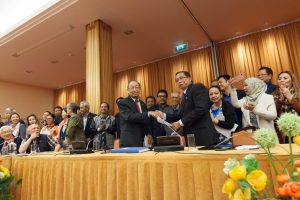 The National Democratic Front of the Philippines (NDFP) and the Government of the Republic of the Philippines (GRP) today agreed to work together to forge an interim joint ceasefire agreement. They formalized their commitment through a document entitled Agreement on an Interim Joint Ceasefire which was signed this afternoon by NDFP panel chair Fidel Agcaoili and GRP panel chair Silvestre Bello III.
The National Democratic Front of the Philippines (NDFP) and the Government of the Republic of the Philippines (GRP) today agreed to work together to forge an interim joint ceasefire agreement. They formalized their commitment through a document entitled Agreement on an Interim Joint Ceasefire which was signed this afternoon by NDFP panel chair Fidel Agcaoili and GRP panel chair Silvestre Bello III.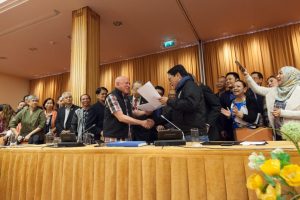 The National Democratic Front of the Philippines (NDFP) signed an agreement on an interim joint ceasefire in order to ensure that negotiations with the Government of the Republic of the Philippines (GRP) on basic socio-economic and political reforms move forward.
The National Democratic Front of the Philippines (NDFP) signed an agreement on an interim joint ceasefire in order to ensure that negotiations with the Government of the Republic of the Philippines (GRP) on basic socio-economic and political reforms move forward.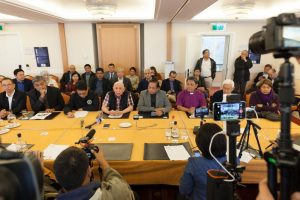 The National Democratic Front of the Philippines (NDFP) today reiterates and confirms the February 19, 2017 statement of the Communist Party of the Philippines (CPP) directing the concerned New People’s Army (NPA) units to expedite the release of the six (6) captured prisoners of war (POWs) still in their custody as a “positive gesture” for the ongoing fourth round of the GRP-NDFP peace talks.
The National Democratic Front of the Philippines (NDFP) today reiterates and confirms the February 19, 2017 statement of the Communist Party of the Philippines (CPP) directing the concerned New People’s Army (NPA) units to expedite the release of the six (6) captured prisoners of war (POWs) still in their custody as a “positive gesture” for the ongoing fourth round of the GRP-NDFP peace talks.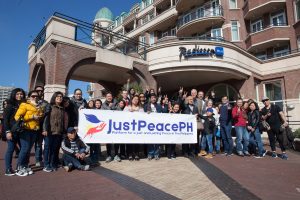 The Communist Party of the Philippines (CPP) congratulates the NDFP and GRP Negotiating Panels for successfully pushing through with the opening of the fourth round of peace negotiations yesterday despite the peace-spoiling by stooges of US imperialism in the military establishment. To support the talks, the Party calls on the Filipino people to reject these US stooges and resist their efforts to spoil the NDFP-GRP peace negotiations.
The Communist Party of the Philippines (CPP) congratulates the NDFP and GRP Negotiating Panels for successfully pushing through with the opening of the fourth round of peace negotiations yesterday despite the peace-spoiling by stooges of US imperialism in the military establishment. To support the talks, the Party calls on the Filipino people to reject these US stooges and resist their efforts to spoil the NDFP-GRP peace negotiations.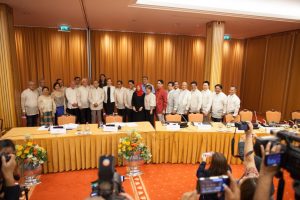 The fourth round of formal peace talks between the National Democratic Front of the Philippines (NDFP) and the Government of the Republic of the Philippines (GRP) formally opened this morning at Noordwijk, The Netherlands, with both Parties expressing determination to resolve current problems and move the talks forward.
The fourth round of formal peace talks between the National Democratic Front of the Philippines (NDFP) and the Government of the Republic of the Philippines (GRP) formally opened this morning at Noordwijk, The Netherlands, with both Parties expressing determination to resolve current problems and move the talks forward.